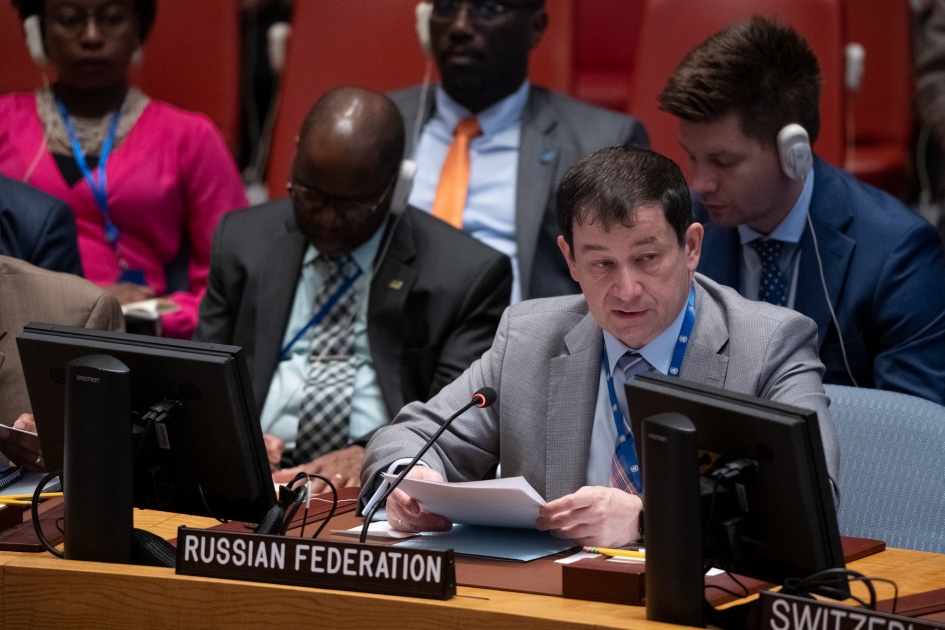Statement by Chargé d'Affaires of the Russian Federation Dmitry Polyanskiy at UNSC briefing on Libya
Mme.President,
We thank Special Representative of the Secretary-General for Libya and Head of the UN Support Mission (UNSMIL) in that country for the briefing. We also take note of the presentation by a civil society representative.
Unfortunately, for more than 10 years Libya has been unable to recover from the consequences of NATO’s military intervention that basically destroyed the statehood, undermined territorial integrity and devastated the economy of the country. As a result, despite many attempts, initiatives for recovery fail to be implemented at a desired pace there. Diverging interests of external stakeholders and the lack of a neutral and well-coordinated support for national dialogue create an ever-growing trend towards a divide.
Nevertheless, the unstopping efforts of the Libyan people to reassemble the country piece by piece do bring results. We welcome the decision of 7 July to establish a High Financial Oversight Committee and the decision of 20 August to unite the western and eastern central banks, which have been functioning separately since 2014. We hope that the work of this unified institution, which among other things is responsible for distributing proceeds from trade in energy sources, will be able to boost political integration.
Mme.President,
The key issue on the Libyan agenda is the preparation for and convening of presidential and parliamentary elections, which would put an end to the protracted duality of power and restore unity and territorial integrity of Libya, enabling it to address effectively issues of post-crisis recovery.
In this connection, we closely monitor the developments at the constitutional track of the Libyan political process. On 25 July, heads of the Libyan House of Representatives and the High Council of State announced to have finalized and endorsed at the level of their respective authorities a roadmap for holding a general vote and forming a new government. Before that, a number of critical agreements were made at the end of June in the Moroccan city of Bouznika in the framework of the “6+6” Joint Committee that also had been established following their initiative.
We call on all Libyan stakeholders to double their efforts and finally create acceptable conditions for holding presidential and parliamentary elections within the foreseeable future. We proceed from the understanding that at the end of the day, it must be Libyans themselves to decide when and how to hold elections. As a matter of principle, it is essential to focus on supporting them, but not to decide for them.
Unless all the key political forces in Libya recognize the results of the people’s vote, deeper destabilization and another spiral of violence are imminent. That is why the electoral process must be transparent, truly inclusive, and cover all the leading political forces of former Jamahiriya, including representatives of former authorities, on a non-discriminatory basis.
Mme.President,
It is obvious to us that in the current circumstances, true progress in Libya can be achieved only through joint efforts of all Libyan stakeholders and influential global and regional actors under the central role of the United Nations. The role of the United Nations and UNSMIL as its key instrument for Libya is demanded today as never before. We once again reiterate our support for SRSG Bathily and his tireless efforts to elaborate acceptable solutions for addressing the internal political stalemate and giving an impetus to political dialogue.
As President V.Putin said at the plenary meeting of the second Russia-Africa summit on 28 July, it is essential to achieve true national unity and not let Libya turn into an arena for third states’ confrontation. While realizing all the challenges associated with this process, Russia will do its best to promote constructive interaction of internal Libyan forces.
Colleagues,
The Libyan case clearly shows that any separate initiatives, including the ones that suggest creating formats or roundtables for facilitation of a settlement but do not provide for participation of all influential international and regional actors, as well as representatives of Libya itself, will not lead to the desired results. We stress again that our country stands ready for a constructive interaction with all interested sides. At the same time, we cannot but be concerned over attempts of some Western states to use the situation in Libya for addressing certain geopolitical and economic tasks, including at the hydrocarbons market.
Mme.President,
It is reassuring that for more than 2 years there have been no active hostilities in Libya. However the security situation remains rather fragile, which is confirmed by recent armed clashes in Tripoli, Al-Zawiya, and other cities. Another worrisome aspect is the strengthening of cells of international and regional terrorist groups, as well as the growing chaos in the border areas of the former Jamahiriya, some of whose neighbors are now experiencing a period of instability. In addition, we note the need to intensify efforts to create the necessary conditions for the integration of the country's disparate military components into a unified Libyan army. It will take great energy and political will to achieve this goal.
In that connection, we welcome the work of the "5 + 5" Joint Military Committee, which is making further progress towards a complete settlement. One of the key areas here is eventual cancellation of foreign military presence on the Libyan territory. We advocate a synchronized, well-balanced, gradual and step-by-step withdrawal of all non-Libyan armed groups and military units.
Thank you.
